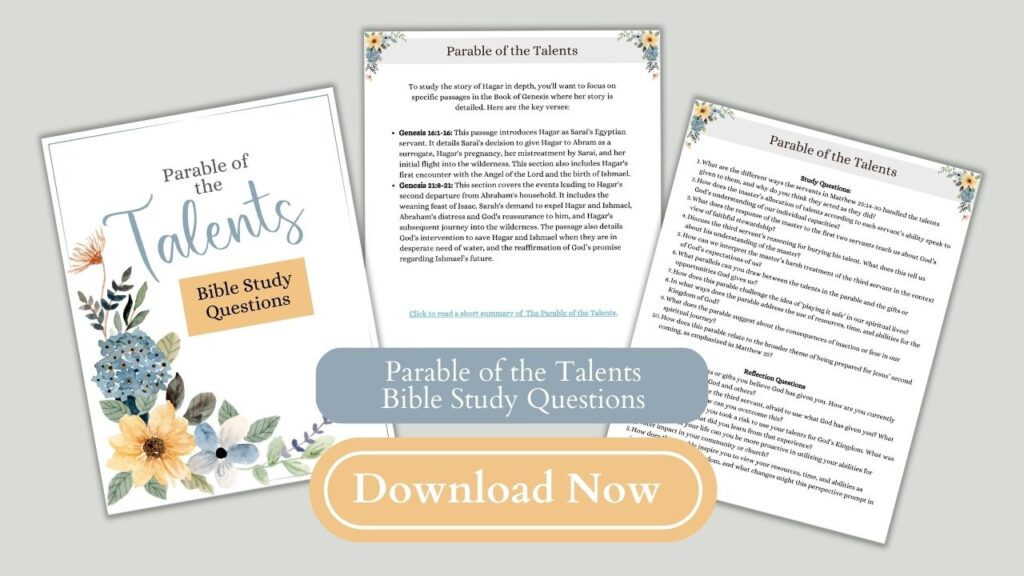One of Jesus’ most famous parables is The Parable of the Talents (told in Matthew 25:14–30). It’s a great story about a rich man who left his three servants with talents and when he came back he asked them to give an account of what they had done with the talents.
Jesus’ parables are engaging and filled with deep and practical lessons for everyday life. They reveal divine truths and secrets of living for him and about the kingdom of God.
But what does the parable of the talents symbolize? What is the lesson we are to learn from it?
Let’s dive into the meaning of this parable which illustrates the kingdom of heaven. The Parable of the Talents will help us live more in line with God’s purpose in all areas of our lives.

Parable of the Talents Summary
The Parable of the Talents is told immediately after The Parable of the Ten Virgins. Both of these parables were about the kingdom of heaven.
The Parable of the Talents which is also referred to as The Parable of the Bags of Gold, The Parable of the Coins, and The Parable of the Three Servants is found in the Bible in Matthew 25:14-30 and Luke 19:12-28.
It’s about a rich man who entrusted his property to his own servants and went to a far country. To the first servant, he gave five talents, to the second servant he gave two talents and finally to the third servant he gave one talent.
The first and second servants went and traded their talents and gained double what they had so they ended up with ten and four talents respectively. The one with one talent hid his master’s money.
After a long time when the master of those slaves came back each servant gave an account of the money. The one with five talents presented the ten talents and the one with two talents presented the four talents.
The master was pleased with them both and entrusted them with more. They were also invited to share in the master’s happiness.
But the master was upset and angry with the third servant who expressed that he had hidden his talent because of fear of losing the talent and wanted to give it back to his master. He explained that he did this because he knew that his master was a harsh man who reaped where he didn’t sow.
The master mentioned that he could have put it into the bank and it could have gained interest but instead, he had done nothing making him a lazy servant and worthless slave.
The master asked that the talent be taken away from him and given to the one with ten talents. And for the wicked and lazy servant, he was cast out into the outer darkness where there was weeping and gnashing of teeth.

Parable of the Talents Meaning
Let’s look at the interpretation of the Parable of the Talents. In Biblical times a “talent” was a measure of weight, typically used to quantify precious metals like gold and silver.
A single talent was a significant amount of money. One talent would be equivalent to 20 years of wages for a common worker.
Today, a talent stands for our God-given resources, gifts, and opportunities, skills. We are given both tangible and intangible resources and should maximize their potential to produce physically and spiritually.
The Master is the Lord Jesus Christ while believers and the disciples of Christ are the servants of the Lord. The Bible refers to us as workers and servants of God.
“And the Lord’s servant must not be quarrelsome but must be kind to everyone, able to teach, not resentful.” 2 Timothy 2:24 NIV
The master delegates the management of his wealth to his servants. God doesn’t work alone in this world. We are his fellow workers working hand in hand with him to bring his plans and purpose to life.
“For we are God’s fellow workers. You are God’s field, God’s building.” 1 Corinthians 3:9 ESV
Everyone has been given talents whether rich, poor, male, female, old, or young. The Lord blesses us according to our ability so that we don’t become jealous of others but shine and grow in what we have.
Jesus Christ came to save us from sin and eternal suffering. Just like the master he left us for a long time and will return one day. He left us with his word and the Holy Spirit to walk with us and guide us. One day he will return to see what we have done with what he gave us.
We need to obey the word and the instructions in it such as loving others, giving, forgiving, and ultimately the Great Commission to spread the Gospel.
“Then Jesus came to them and said, “All authority in heaven and on earth has been given to me. Therefore go and make disciples of all nations, baptizing them in the name of the Father and of the Son and of the Holy Spirit, and teaching them to obey everything I have commanded you. And surely I am with you always, to the very end of the age.” Matthew 28:18-20 NIV
Everything belongs to the Lord Jesus Christ. We are the stewards of all the things he gives us including money. Just like the Master in the Parable, the Lord Jesus will come back for judgment and accountability of what we’ve done with what he has given us.
“For the Father judges no one, but has given all judgment to the Son.” John 5:22 ESV
The master expected great gain from his investments. He expected an increase. The first servant and second servant were faithful, hard-working, and had faith in the Lord. They earned 100% returns.
When they presented their results to the master, they were rewarded. They multiplied what they had been given and were put in charge of many things because they were faithful to the little they had.
“Whoever can be trusted with very little can also be trusted with much, and whoever is dishonest with very little will also be dishonest with much. Luke 16:10 NIV
The third servant didn’t take action and blamed the Master. He didn’t even try which made the master very angry with him. He was lazy he didn’t invest the effort that was required to produce something.
He didn’t take accountability and missed an opportunity to multiply what he was given.
He is like Adam who blamed Eve for breaking God’s command or Eve blaming the serpent for tempting her to eat the forbidden fruit. They all didn’t take accountability for their actions.
The master was not expecting the servant with one talent to have gained five more but to have worked with what he had and multiplied it. The return expected is proportionate to the talent.
The master expects and cares for the results that are produced. He expects his servants to be wise, intentional, committed, and hard-working.
The wicked servant was not evil but he wasn’t good either. He was lukewarm and God wasn’t pleased with him so he sent him away and punished him.
“But since you are like lukewarm water, neither hot nor cold, I will spit you out of my mouth!” Revelation 3:16 NLT
The master became disappointed and angry with this servant. We cannot ignore the gifts God has given us nor waste them. Not only does the servant blame the master, but he also has fear, unlike the first and second servants who had faith.
He was scared of what would happen if he invested the talent but this stopped him from maximizing his potential.

Parable of the Talents Lessons
Just like all of Jesus’ parables, there are key takeaways we can learn and practice from this story. Let’s take a deep dive into the many valuable lessons we can learn from The Parable of the Talents.
1. God gives us talents according to our abilities.
One of the biggest lessons of this parable is that God gives us gifts and talents according to what we can handle and to his purpose.
He uses his own discretion and judgment. We will be judged in proportion to what we receive.
We don’t need to compare ourselves with what others have received but be content and trust that the Lord knows what’s best for us.
2. Faith without good works is dead.
The only way faith works is when we put it into action. We need both to live a life that glorifies the Lord. The servants who multiplied their talents trusted in the Lord and also went out to work and invest the money.
In our lives, we are also to have faith and work hard to multiply the Lord’s money and other gifts and resources that he’s entrusted to us.
“So too, faith, if it does not have works [to back it up], is by itself dead [inoperative and ineffective].” James 2:17 AMP
3. We are stewards and not owners.
Everything in this world is owned by God. The time and resources that we’re entrusted with in this life are not our own. As stewards, it’s important to take care of what we’ve been given.
“The earth is the Lord’s, and everything in it. The world and all its people belong to him.” Psalm 24:1 NLT
4. Don’t hide or misuse what God gives you.
The blessings, favor, opportunities, skills, gifts, resources, and talents God gives you are for his glory and purpose. Don’t hide these like the slothful servant but use them to serve God and others around you.
As Jesus’ disciples, we are called to be the light in a dark and evil world and put our talents to good use. We have one life to live and we should live it courageously and confidently without fear.
After all, the Lord is with us always so we are not alone but have a helper always by our side.
“In the same way, let your light shine before others, that they may see your good deeds and glorify your Father in heaven.” Matthew 5:16 NIV
5. God rewards those who act in faith.
God rewards those who put their talents into action and are wise stewards. The servants who multiplied the master’s original investment and took small, intentional steps were put in charge of many things.
“His master said to him, ‘Well done, good and faithful servant. You have been faithful over a little; I will set you over much. Enter into the joy of your master.” Matthew 25:23 ESV
Doors and opportunities will open for more responsibilities and you will be entrusted with more when you are faithful with what you have. At the end of our lives, we will be rewarded with a crown by the judge when we finish the race and keep the faith.
“I have fought the good fight, I have finished the race, I have kept the faith. Now there is in store for me the crown of righteousness, which the Lord, the righteous Judge, will award to me on that day—and not only to me, but also to all who have longed for his appearing.” 2 Timothy 4:7-8 NIV
6. Fear stops us from acting in faith.
The third servant acted in fear. Fear stops us from using our resources for God’s glory. It stops us from using the potential we’ve been given. When we don’t take action nothing happens.
Fear paralyzes us and stops us from enjoying a life of abundance and success. It also shows that we don’t trust God’s power and don’t believe his promises. Fear is from the enemy not from the Lord.
“For God gave us a spirit not of fear but of power and love and self-control.” 2 Timothy 1:7 ESV
7. Taking accountability is important.
When the third servant was asked by the Master what he had done with his talent he blamed the master for being a hard man who doesn’t reap where he sowed.
Blaming others is never a good idea especially blaming God.
After all, God loves us and wants the best for us. We can never blame God for anything that happens to us because he gives us everything we need in this life and he is always on our side.
We are held accountable for what we do with what God gave us.
“So then, each of us will give an account of himself to God.” Romans 14:12 AMP
8. You are enough .
The enemy often wants us to believe that we are not enough or we don’t have enough but this parable proves to us that that is not the case. The Lord gives us the talents that we can use to fulfill His purpose. We are complete and enough in the Lord.
9. God doesn’t accept excuses.
In the end, the lazy servant had excuses for not being a good steward, and for not growing and multiplying his talents but these were not acceptable. Instead, the Lord punished him and he will judge and punish us too.
One of the people who gave excuses in the word of God is Moses. When God sent him to rescue the Israelites from slavery, he spoke about the fact that he couldn’t speak eloquently, didn’t have a position, and other excuses.
But with each excuse, God gave him a reason and answer to stand on (Exodus 3:9-14, Exodus 4:1-17).
In the same way, there is no excuse for not using what we have for God’s glory and kingdom even if it’s little. When we make excuses we lose out on a lot.
Just like the lazy servant who lost an opportunity to harvest more, he lost an opportunity to steward what he had and lost the master’s trust and belief in him.
10. By faith, everything we have will be multiplied.
Jesus Christ is in the business of multiplying the little to plenty.
He did this with the five loaves of bread and two fish (Matthew 14:13-21) that ended up feeding thousands of people and changing the water that became the best wine at the wedding of Cana (John 2:1-11).
When you have faith in the Lord, just like the first and second servant, he will multiply even the little you have into abundance.
11. If you don’t use something you’ll lose it.
The lazy slave lost what he had originally because he didn’t use it and it’s the same for us.
For example, when we go to church week after week but don’t apply the message we learn or share the Gospel and share what God reveals to us in the word, we’ll end up forgetting it.
The more we use what we have the more we grow in faith and help those around us.

12. You reap what you sow.
The trustworthy slave who did much work and multiplied the original investment reaped more talents and gained the master’s trust and praise.
On the other hand, the wicked servant who hid his talent reaped punishment. There are consequences to the actions and choices we make.
“Do not be deceived: God cannot be mocked. A man reaps what he sows.” Galatians 6:7 NIV
13. True faith bears fruit.
A Christian is expected to produce and grow spiritual fruit. That’s why the word of God tells us about the fruit of the spirit. .
Faith is an active process that involves a continual desire to know God and to fulfill the work God assigns us in this life.
“But the fruit of the Spirit is love, joy, peace, forbearance, kindness, goodness, faithfulness, gentleness and self-control. Against such things there is no law.” Galatians 5:22-23 NIV
14. God expects us to grow spiritually.
We expect our children to grow and go through different life phases and stages and become mature and God expects the same from us.
The Master expected growth in resources and in the servant’s maturity as well.
“Like newborn infants, long for the pure spiritual milk, that by it you may grow up into salvation.” 1 Peter 2:2 ESV
The good news is God has placed the Holy Spirit in us who helps us along the way.
He reveals the word of God to us, reminds us of Biblical promises, and helps and comforts us at all times which makes us grow spiritually.

15. We prove our trust before we can be trusted with more.
As parents of young kids, we can’t trust our children with much because of their age and level of maturity.
But as they grow, we start trusting them with a few responsibilities and as they become faithful in the little we give them more responsibilities.
In the same way, the first two servants could be trusted with much because they had proven they could be faithful.
The one talent that had been given to the third servant was taken from him because he proved that he couldn’t be trusted with little.
Want to learn more about the Parables of Jesus? Visit our Parables Study Listing!
The Parable of the Talents is an inspiring and encouraging story. It inspires us to overcome fear and motivate us to maximize the talents God has given us.
Through this story, we learn the importance of using the opportunities God gives us, hard work, accountability, and stewardship in our everyday lives.
We grow in faith when we take the lessons from this story and practice them in our own lives.
The Lord Jesus Christ is our master and as his disciples, we are called to live in a way that brings him glory and honor.
Just live the servants in the parable, we will be called to give an account one day of what we did on earth and we desire to be faithful servants who share in the master’s happiness in eternity.
Find more lessons on parables: